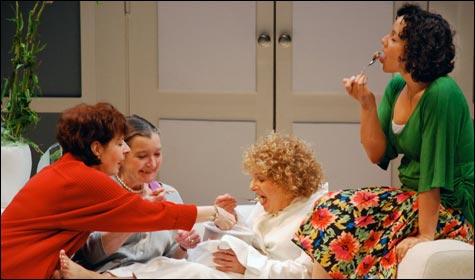
THE CLEAN HOUSE: Sarah Ruhl doesn’t allow artificial boundaries to define how we see the world. |
There’s something awe-inspiring about watching an ensemble in which everyone is performing at the top of his or her game. The New England Patriots of the first half of the season come to mind — which makes that February 3 performance all the more painful.
But I have no painful memories associated with the New Repertory Theatre’s crack production of Sarah Ruhl’s 2005 Pulitzer finalist, The Clean House (through March 23). In fact, if the Pulitzer panel had seen this production, maybe Ruhl would have gotten the gold. (Her latest, Dead Man’s Cell Phone, with Mary-Louise Parker, has just opened Off Broadway at Playwrights Horizons.) Not only do all five mega-talented actors turn in highlight-reel performances, but director Rick Lombardo and his design team make the space at the Arsenal Center for the Arts come alive. Some theater folk have complained that the New Rep sacrificed too much intimacy in its move from its former Newton-church home, but Lombardo uses the new stage space with a free-spirited swagger that the Newton stage could never have accommodated.
Of course, the primary inspiration for all the artistic frolicking in Watertown is the playwright’s fanciful concoction of off-center metaphysical speculation and comic social observation. Call it magical kitchen-sink realism. Brazilian born-and-bred Matilde is the maid for a pair of married doctors, but she’s too depressed to clean house because all she wants to do is tell jokes. In fact, she’s in search of the perfect joke, though she’s wary of that, too. Her mother died laughing at a joke her father told her.
The play opens with Matilde (Cristi Miles) telling a joke in Portuguese with enough sexual body language that you almost don’t need a translation. It’s a testament to the young Miles that she’s never in danger of being overshadowed by two of the great leading ladies of Boston theater making their first on-stage appearance together, Paula Plum and Nancy E. Carroll.
It’s been worth the wait. Plum plays Lane, the one character with two feet planted firmly on the ground, in this case her upper-middle-class floor. (“I did not go to medical school to clean my own house.”) But that expensive white rug is about to be pulled out from under her feet when she finds out that her husband has left her — not for a young nurse, but for an older woman on whom he’s performed a mastectomy.
Not laughing yet? Enter Carroll as Virginia, Lane’s anal sister, who takes pity on Matilde and sees doing the cleaning for her as a way to get closer to Lane. Carroll’s smallest gestures speak volumes about her character’s tightly wound life. She can play serious roles a bit too depressively, but in this comedy her downbeat deadpan could teach Steven Wright a thing or two.